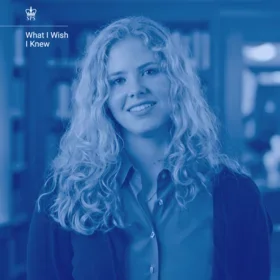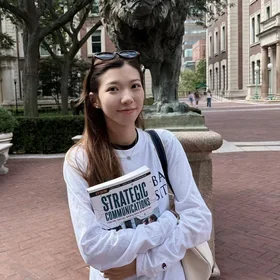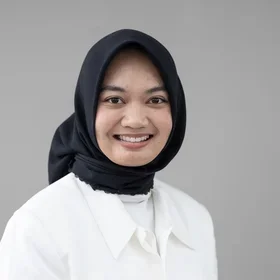After returning to China at the onset of New York’s coronavirus pause in April, Kate Yi Wang, '21SPS, Applied Analytics, decided to return to campus to get the most out of her education. Last Fall, Wang took HyFlex courses and strengthened her connections with faculty, peers, and alumni. The Secretary and Social Committee Chair of the SPS Student Government and Vice President of Business Development of the Applied Analytics Club, Wang aspires to create new educational paradigms with business, technology, and analytics and facilitate mutual exchanges of knowledge between Chinese and Western schools. She reflected on her unique term at Columbia last Fall, including her participation in the Career Design Lab’s eMentor program.
Why did you decide to return to Columbia's campus last fall? What's your favorite part about being back on campus?
I went to college in New York, so it is home to me. In the past summer, I was back in China for my strategic consulting internship during the “New York Pause” order. But since my master’s degree is only a year and a half, I knew for sure that if I stayed overseas, I would not be in the best mindset to study and to network. The experience has been really unique because Columbia limits the number of students in classrooms to adhere to social distancing and ensure the safest interactions. The silver lining is, I can have more direct and organic conversations with the professors and my classmates with COVID safety precautions. For example, I was able to cultivate my relationship through having deep conversations with our Program Director, Kitty Kay Chan; she also taught my class, Applied Analytics Frameworks, and Methods. That was an experience that I wouldn’t have if I were at home and something that I really value in going to graduate school.
One thing I missed about being on campus is being in the constant presence of classmates, professors, and people’s laughs and talks around campus. However, I feel really safe and secure on campus because the COVID testing location is right at the gates. I got tested several times with an easy online appointment process. Another precaution that I notice about the classrooms is that campus staff put labels on the chairs to tell you where you can and cannot sit according to social distance guidelines. I am definitely looking forward to all of my classmates coming back in the near future so we can have those organic conversations after class or in class.
When I was researching graduate programs... I found some of them either too technical or too business-oriented. Columbia’s Applied Analytics program was suitable for me for its mix of technical and management cores... I’ll be able to apply these universal and transferable skills in any field that I want... I can honestly say that the courses I’ve taken have met the expectations that I had before enrolling in the program."
What led you to pursue an M.S. in Applied Analytics? Why at Columbia, in particular?
I completed my undergraduate degree in education studies (with a specialization in entrepreneurship and policies), with minors in business and computer science. I found really intriguing intersections among these three fields and wanted to dive deeper into the interdisciplinary areas, thus landing on pursuing a master’s degree in Applied Analytics. When I was researching graduate programs that can sharpen my skills in incorporating analytical approaches to impact decision-making at all levels within an organization, I found some of them either too technical or too business-oriented. Columbia’s Applied Analytics program was suitable for me for its mix of technical and management cores that would ultimately help me succeed in my career, not to mention the amazing alumni resources that I could utilize. I’ll be able to apply these universal and transferable skills in any field that I want -- including education technologies, strategic consulting, and data analytics. I can honestly say that the courses I’ve taken have met the expectations that I had before enrolling in the program.
What are your career aspirations?
I want to work in strategic or tech consulting, or in product management on projects related to education capacity building. With my interdisciplinary and international background, I will harness my fluency in technical and non-technical languages to work through challenging problems for organizations. I want to help organizations to differentiate themselves not just in domestic markets, but in global ones. Eventually, I hope to define my career by making an impact, and may start my own social entrepreneurship organization! In the past, China would need a lot of support from Western educational institutions and systems. Through my visit to several new schools back in China and the conversations with the principals, I realized that Western countries also benefit from learning from and collaborating with Chinese educational institutions, especially in STEAM (science, technology, engineering, the liberal arts, and mathematics) education. I want to be the bridge among these various styles of education.

As a HyFlex student last fall, Wang conducted most of her coursework online, but she says that the on-campus classroom experiences are richer and more intimate now with fewer people in a physical setting: "I was able to cultivate my relationship through having deep conversations with our Program Director, Kitty Kay Chan... That was an experience that I wouldn’t have if I were at home, and something that I really value in going to graduate school."
How is the Applied Analytics program and the Columbia network helping you to stand out among your peers?
I am involved in several student organizations, including the SPS Student Government, serving as the E-board and Chair of the Social Committee and the Applied Analytics Club as Vice President of Business Development. Because of these engagements, I can utilize resources to empower and elevate fellow students as well as myself to succeed in our careers and campus life. Take student government as an example; I take concerns and suggestions from international students and represent them in meetings to facilitate effective communication among the student body and the school administration. Contributing and making space for others are important to my work, and it’s truly delightful to see how my fellow classmates have grown to support and inspire each other in this challenging time. It’s not about standing out, but more about building community and lifting each other up. The people who I work with in the Student Government and the Applied Analytics Club are amazing; they all come from different programs across SPS and wear many hats. We even have monthly meetings with Dean Troy Eggers! He is super supportive of our work. Interactions like this help to break down barriers between the school administration and the student body.
Before I entered Columbia, I had a couple of offers from other schools and I was still considering which one to enroll in. I reached out to a lot of people on LinkedIn from each of the schools. The most supportive person I connected with was the former president of the Applied Analytics Club at Columbia, Matthew Lee."
What compelled you to sign up for the eMentorship program?
Before I entered Columbia, I had a couple of offers from other schools and I was still considering which one to enroll in. I reached out to a lot of people on LinkedIn from each of the schools. The most supportive person I connected with was the former president of the Applied Analytics Club at Columbia, Matthew Lee. He gave me a great deal of advice on succeeding in the program. One week after I told him that I’d enrolled in Columbia’s Applied Analytics master’s program, the CDL sent out the eMentorship form and I saw that he was listed as a Mentor! I got very excited as he has been a role model to me and is someone who could guide me through the process of recruiting and campus life. I had to apply for three mentors and I am very grateful to the CDL for pairing me with Matthew.
What was the most rewarding or surprising part of the eMentorship?
My mentor is a very successful industry professional, so whenever I asked for help or advice, he would approach my inquiry with an industry-informed perspective. For example, he wouldn’t just proofread my resume; he would actually try to frame my bullets and phrases that were most used and valued in the consulting industry. To have that connection with someone in the industry who went through the same master’s program as me has been the most rewarding part of the eMentorship program thus far.


